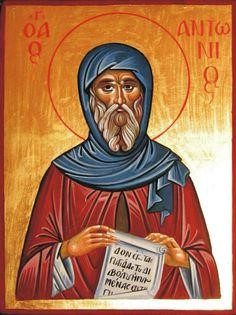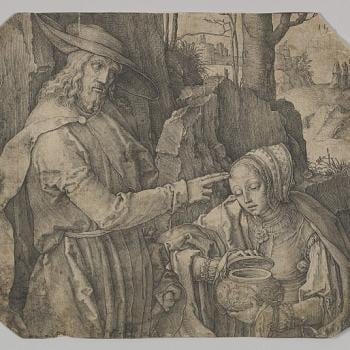I first heard of John the Dwarf when reading Thomas Merton’s Wisdom of the Desert Fathers. This book was enormously important to me, and remains so. Merton’s selection and his translation of the texts emphasize the echoes of a spirituality akin to the early Chan masters of China.
Later I would read texts that show the similarities were perhaps not quite as similar as Merton suggested. But, maybe that’s even better. If we do drink from a single deep source, our particular wells are dug from wildly different soil. And the flavors of those waters can be quite different.
As I’ve come to learn how the universal is only ever known in the particular, importantly I’ve found that universal in its kaleidoscopic particulars is always rich and lush. And it contains gifts. As well as the odd trap.
Wisdom and foolishness are always mixed up. And seeking guidance and discerning which foolish wisdom is healthful and which might not be, at least on my way, has been an important project. And it remains so.
Looking at the differences of the Desert Fathers and Mothers and those of my Chan ancestors has allowed me, and perhaps us, to notice what the great Transcendentalist divine Theodor Parker called out as the transient and permanent.
And. But. Of course, all things are transient.
But. And.
I was so glad to be introduced to John and his teachings. A true pointer to the deep.
If you’re unfamiliar with him John Colobus or Kolobos, and best known as John the Dwarf, was one of the greatest of the Desert Fathers and Mothers. He lived roughly between 340 and 405. He was born in Thebes, his family was said to be poor but devout. At eighteen he fled to the desert in quest of God. He became a disciple of Saint Pambo. There he grew in wisdom. After the death of his teacher, the Coptic Pope Theophilus ordained John a priest and set him as abbot of the monastics who were gathering around him. Driven out by war he eventually settled on Mount Colzim, where he died.
His feast is celebrated today, the 17th of October, in both the Coptic and Roman Churches, and on the 9th of November in the Eastern Orthodox Churches.
What I offer here are thirteen of the forty-seven preserved sayings as translated by Benedicta Ward and gathered in her wonderful collection Sayings of the Desert Fathers.
Just a taste.
***
- It was said of Abba John the Dwarf that he withdrew and lived in the desert at Scetis with an old man of Thebes. His abba, taking a piece of dry wood, planted it and said to him, ‘Water it every day with a bottle of water, until it bears fruit.’ Now the water was so far away that he had to leave in the evening and return the following morning. At the end of three years the wood came to life and bore fruit. Then the old man took some of the fruit and carried it to the church saying to the brethren, ‘Take and eat the fruit of obedience.’
- It was said of Abba John the Dwarf, that one day he said to his elder brother, ‘I should like to be free of all care, like the angels, who do not work, but ceaselessly offer worship to God.’ So he took off his cloak and went away into the desert. After a week he came back to his brother. When he knocked on the door, he heard his brother say, before he opened it ‘Who are you?’ He said, ‘I am John, your brother.’ But he replied, ‘John has become an angel, and henceforth he is no longer among men.’ Then the other begged him saying, ‘It is I.’ However, his brother did not let him in, but left him there in distress until morning. Then, opening the door, he said to him, ‘You are a man and you must once again work in order to eat.’ Then John made a prostration before him, saying, ‘Forgive me.’
- Some old men were entertaining themselves at Scetis by having a meal together; amongst them was Abba John. A venerable priest got up to offer drink, but nobody accepted any from him, except John the Dwarf. They were surprised and said to him, ‘How is it that you, the youngest, dared to let yourself be served by the priest?’ Then he said to them, ‘When I get up to offer drink, I am glad when everyone accepts it, since I am receiving my reward; that is the reason, then, that I accepted it, so that he also might gain his reward and not be grieved by seeing that no-one would accept anything from him.’ When they heard this, they were all filled with wonder and edification at his discretion.
- One day when he was sitting in front of the church, the brethren were consulting him about their thoughts. One of the old men who saw it became a prey to jealousy and said to him, ‘John, your vessel is full of poison.’ Abba John said to him, ‘That is very true, abba; and you have said that when you only see the outside, but if you were able to see the inside, too, what would you say then?’
- Abba Poemen said of Abba John the Dwarf that he had prayed God to take his passions away from him so that he might become free from care. He went and told an old man this: ‘I find myself in peace, without an enemy,’ he said. The old man said to him, ‘Go, beseech God to stir up warfare so that you may regain the affliction and humility that you used to have, for it is by warfare that the soul makes progress.’ So he besought God and when warfare came, he no longer prayed that it might be taken away, but said, ‘Lord, give me strength for the fight.’
- Abba John said, ‘Who sold Joseph?’ A brother replied saying, ‘It was his brethren.’ The old man said to him, ‘No, it was his humility which sold him, because he could have said, “I am their brother” and have objected, but, because he kept silence, he sold himself by his humility. It is also his humility which set him up as chief in Egypt.’
- He also said, ‘Humility and the fear of God are above all virtues.’
- It was said of Abba John that when he went to church at Scetis, he heard some brethren arguing, so he returned to his cell. He went round it three times and then went in. Some brethren who had seen him, wondered why he had done this, and they went to ask him. He said to them, ‘My ears were full of that argument, so I circled round in order to purify them, and thus I entered my cell with my mind at rest.’
- Abba John gave this advice, ‘Watching means to sit in the cell and be always mindful of God. This is what is meant by, “I was on the watch and God came to me.” ‘ (Matt. 25, 36)
- It was said of the same Abba John that when he returned from the harvest or when he had been with some of the old men, he gave himself to prayer, meditation and psalmody until his thoughts were re-established in their previous order.
- One of the Fathers asked Abba John the Dwarf, ‘What is a monk?’ He said, ‘He is toil. The monk toils at all he does. That is what a monk is.’
- Abba John the Dwarf said, ‘A house is not built by beginning at the top and working down. You must begin with the foundations in order to reach the top.’ They said to him, ‘What does this saying mean?’ He said, ‘The foundation is our neighbour, whom we must win, and that is the place to begin. For all the commandments of Christ depend on this one.’
- The old man said that there were three philosophers who were friends. The first died and left his son to the care of one of the others. When he grew up he had intercourse with the wife of his guardian, who found them out and turned the boy out of doors. Although the young man came and asked his guardian to forgive John the Dwarf [ 95 him he would not receive him, but said, ‘Go and work for three years as a ferryman and I will forgive you.’ After three years the young man came to him again, and this time he said, ‘You still have not done penance; go and work for three more years, and give away all you earn, bearing all insults.’ So he did this, and then his guardian said to him, ‘Now go to Athens and learn philosophy.’ There was an old man who sat at the philosophers’ gate and he used to insult everyone who entered it. When he insulted this young man, the boy began to laugh, and the old man said, ‘Why are you laughing, when I have insulted you?’ He told him, ‘Would you not expect me to laugh? For three years I have paid to be insulted and now I am insulted free of charge. That is why I laughed.’ Abba John said, ‘The gate of the Lord is like that, and we Fathers go through many insults in order to enter joyfully into the city of God.’













